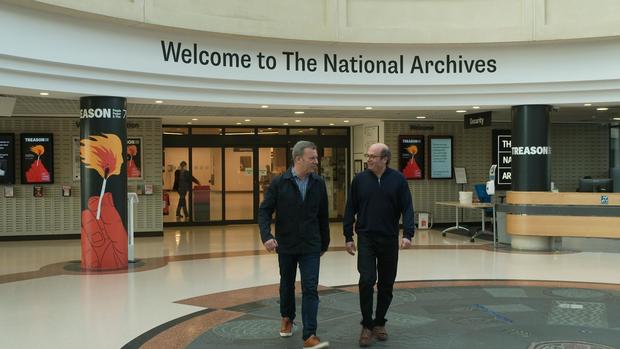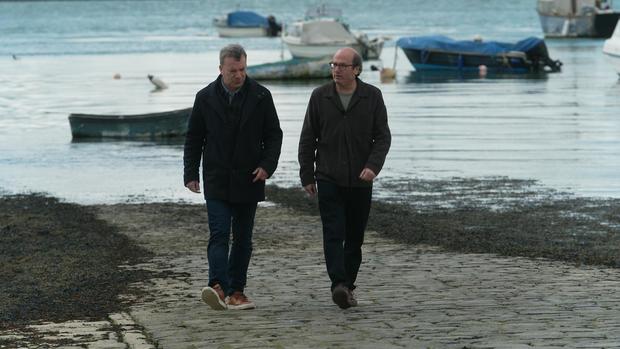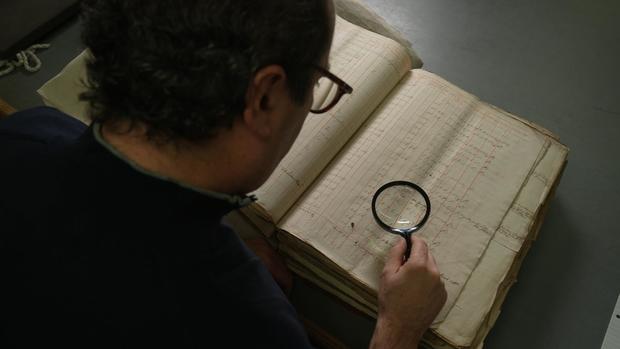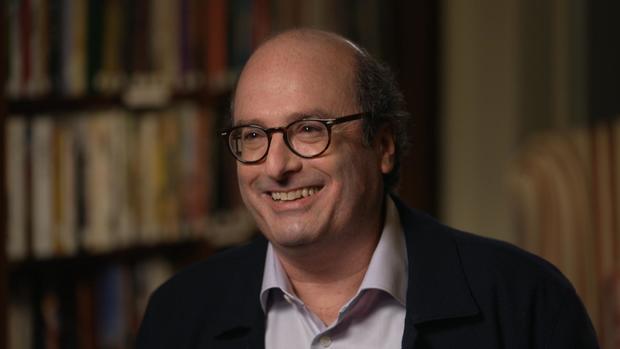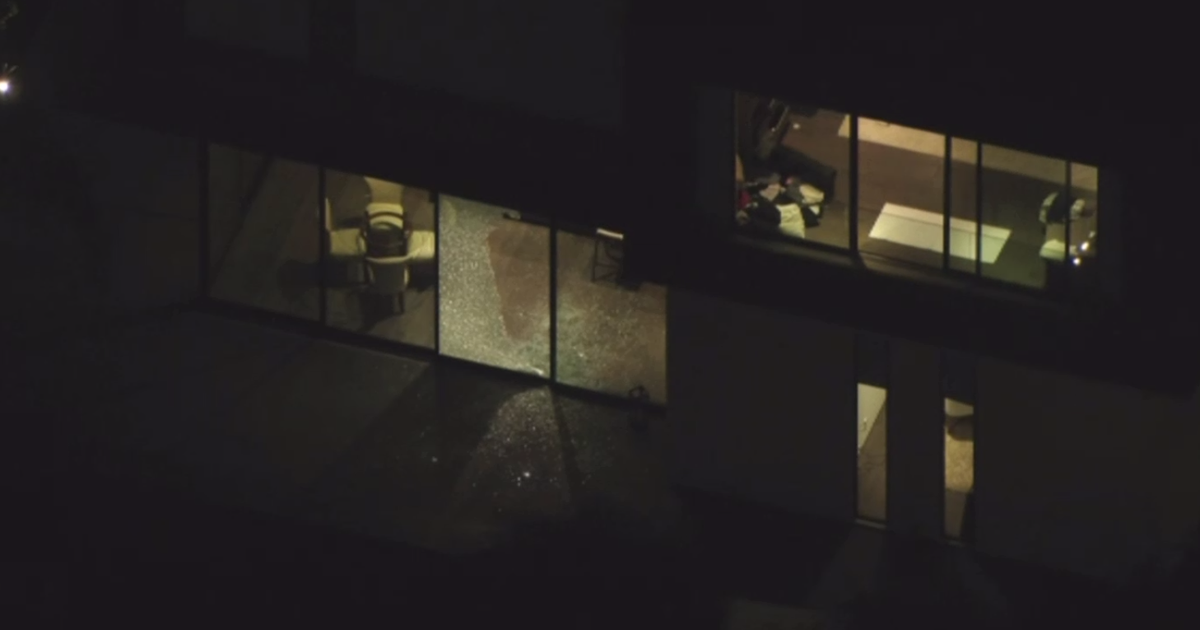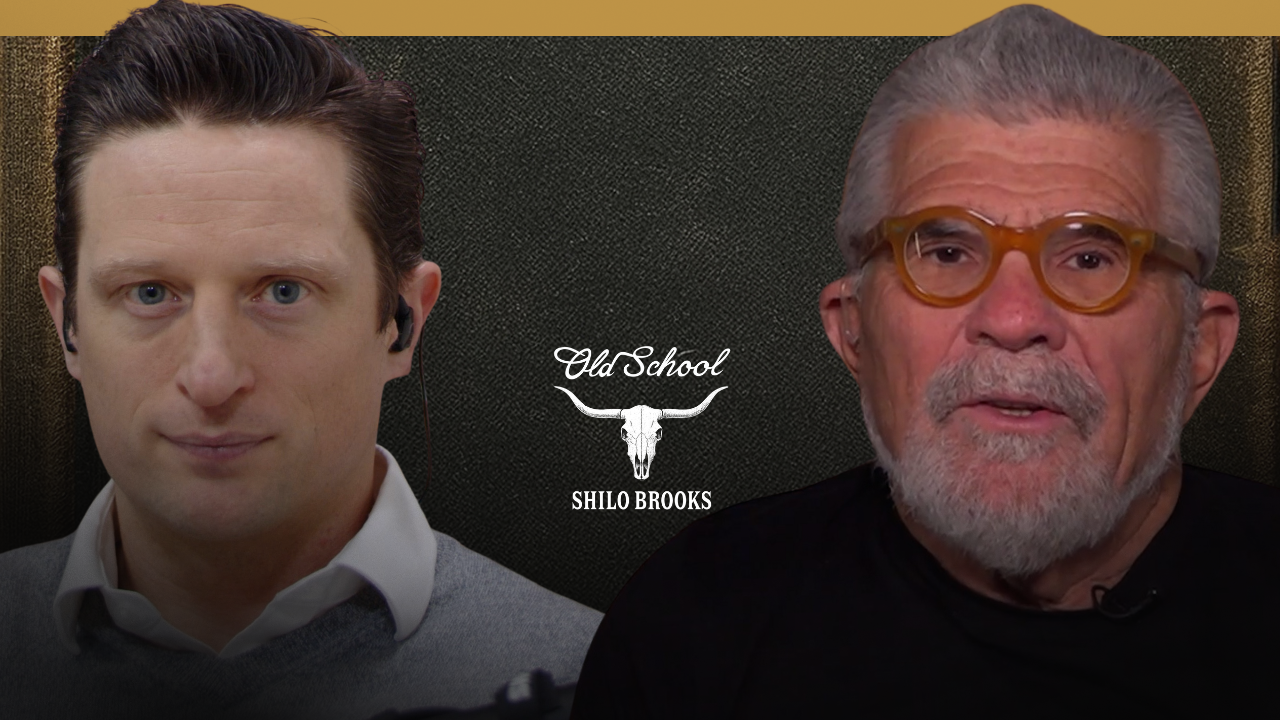Author David Grann tumbles back in time to tell true story of shipwreck and mutiny for "The Wager"
Some authors are perfect matches for their subject matter: John Grisham was once a trial lawyer. John le Carré was once a spy by another name. Then, there's David Grann, who has emerged as one the world's top-selling writers—and darling of Hollywood developers—by venturing into unknown worlds, abandoning his comfort zone. The unlikely adventures of David Grann. His latest book "The Wager," tells of British castaways from the 1740s….it's an open-water quest that becomes a saga of shipwreck, anarchy, betrayal, and murder - imagine "Mutiny on the Bounty" meets "Lord of the Flies"—except every word of it really happened…. Grann's success comes from, yes, meticulous reporting and vivid writing… but also from how he puts the pieces together.
Jon Wertheim: You talk about structuring these stories as a puzzle.
David Grann: Yes.
Jon Wertheim: Is there only one way to solve this puzzle?
David Grann: Well, I-- I'm very weird about this. I-- I do always think there is some kind of idyllic form of a story, like, some, like, perfect, pristine, lost city that you're trying to find and get to.
Jon Wertheim: If you were gonna structure the David Grann story, what would you suggest--
David Grann: Oh God.
Jon Wertheim: Where would we start?
David Grann: Oh gosh, in some archive. Looking semi-blind at some document. That's where it always begins.
We can work with that…We find our subject inside The National Archives in the suburbs of London…unboxing dusty files, consulting documents so frail, they require a pillow for support. Grann spent two years playing detective, gathering facts, source material for his latest book.
David Grann: We're going to have to touch this really carefully.
He took us tumbling back in time to the 18th century.…
David Grann: You see that?
Communing with logbooks, muster books, and diaries from the expedition of the HMS Wager…the warship featured in his book.
David Grann: And here you see the little initials next to their names here. You'll see lieutenant. You'll see AB means able seaman.
Jon Wertheim: How are you deciphering this?
David Grann: When I first looked at a lot of these books, it was like reading gibberish. I was like, 'What-- I don't -- what is this telling me?' And so I would have to look at it again, look at it again, start to figure out the codes, the language they used. But once you do, these documents speak volumes.
All these names and symbols told a larger story. With their Empires at war, a British squadron of roughly 2,000 men set out to capture a Spanish galleon filled with treasure off the Philippines. That meant rounding Cape Horn, negotiating some of the world's most treacherous waters and winds. But, one of the ships in the squadron lost its way just off the coast of Patagonia. Grann showed us on his own map where the Wager got into trouble, a place aptly named.
Jon Wertheim: The Gulf of Pain.
David Grann: They're barreling into the Gulf of Pain. As they're coming around, they're desperately, frantically trying to avoid this land.
The Wager careened into rocks, ripping apart. One hundred forty five castaways, many sick from scurvy, swam to the nearest island….you'd think the name alone—the Gulf of Pain—would discourage visitors, especially one bespectacled 56-year-old man who admits he hates camping.
David Grann: I spent the first two years doing research, in a way very suited to my physical attributes-- which is in archives.
Jon Wertheim: You're indoors.
David Grann: Yes, indoors. But there came a point where I began to fear that I could never fully understand what these 150 or so men had gone through on that island unless I went. There's always a moment where something gnaws at you, something unknown. And so it was then that I decided to try to make this trip.
So in 2019, Grann flew to Chile and chartered a 52-foot vessel…
David Grann: The boat looked-- you know, it looked pretty big. I thought, this is good. This is gonna be-- it's gonna be, like, a Jacques Cousteau expedition. We're gonna be fine. We kind of stay originally through these channels that are sheltered in Patagonia. I think-- it's perfect, it's beautiful. It's a little cold. It's winter. But it's-- it's beautiful. And then there's sort of point where the captain says to me 'All right now-- now we gotta go out into the open sea if we're gonna get to Wager Island.' And that was my first glimpse of these terrifying seas.
Jon Wertheim: Rough seas.
David Grann: It was truly terrifying-- or at least for me. Let me say, my captain seemed cool.
Grann and his crew endured the moody waters over a 10-day journey.
David Grann: I had to sit on the floor hunkered down. The Dramamine was pumping in me…
This is Wager Island, named for the ship that washed up 300 years ago. A spit of inhospitable land, hugging the Pacific coast. Scenic from a distance but you wouldn't want to spend the night. The castaways did months in unrelenting cold and whipping winds. You know it's bad when celery is the big selling point, the only edible thing that grows on the island. Though it does cure scurvy.
David Grann: There were no animals. I kept thinking, 'Oh, there's gotta be something. Like, something. There's gotta be a rat.' But we couldn't find anything.
This depth of detail, it's Grann's earmark. He's created his own subgenre of narrative non-fiction - keeping readers hanging with a page-turning mix of history, journalism and true crime. But it's also literary pointillism. You step back and glimpse a larger tableau—one with broader themes.
Jon Wertheim: This fascinates you?
David Grann: Oh yeah, yeah. Well, you see, I mean, on this island you see everything playing out. You see questions of leadership playing out. You see questions of loyalty playing out, questions of duty playing out. You see human nature being peeled back. All that is taking place in this little tempest.
And this was no one-off. For his first book, 2009's "The Lost City of Z," a number-one bestseller turned into a feature film…
Grann trekked through the Amazon—to a place known as the Green Hell— following the trail of a British explorer, Percy Fawcett.
Jon Wertheim: Did I hear right, you took out supplemental life insurance--
David Grann: Yes, I did. I made sure I got extra travel insurance. I had a little child at the time. There is something-- and I think this is important. And it's not something I really like to talk about, but there is something selfish about these journeys and even something about the people I write about because many of them die on these expeditions.
Grann's swashbuckling takes on an added degree of difficulty on account of a degenerative eye condition he's had since his 20s.
Jon Wertheim: What's the impact of that on your work?
David Grann: I mean, it's terrible when you're on an expedition. Like, you're, like, can't see at night, and you're stumbling, getting lost, or you're falling, or you're on a boat, or something like that but because I know I have this weakness, I'm very acutely observing as much as I can. And in some ways, maybe paying more observation than if I could just take it in so easily.
Grann first put those powers of observation to work as a reporter on Capitol Hill. But, tired of Washington spin, he wanted to write real stories. In 2003, he joined the New Yorker magazine. In one issue, he might write about an eccentric giant squid hunter in New Zealand; in another, a botched death penalty conviction in Texas. All of it predicated on exhaustive research….
David Grann: Please don't judge me.
From his office—itself an inhospitable island of sorts—
Jon Wertheim: Wow…
At his home in a suburb of New York, Grann showed us a pile of research from his 2017 book "Killers of the Flower Moon." The book centered on the mysterious deaths among members of the oil-rich Osage Nation in 1920s Oklahoma. And—boxed up in an archive; where else?— Grann found a smoking gun, evidence of a systemic murder campaign by outsiders.
David Grann: This was secret grand jury testimony. And--and it was unmarked. I mean it was a public record, but I was like, 'Is this supposed to be-- am I allowed to look at this?'
The book has sold nearly 2 million copies…and it ignited a Hollywood auction. The winning bid: $5 million. The film—directed by Martin Scorsese, starring Leonardo DiCaprio—premieres at Cannes next month. (Paramount, parent company of CBS, is a distributor.) It's not lost on Grann that stories birthed in decidedly unglamorous archives, end up on red carpets in the French Riviera. "The Wager," out this week, has also been optioned for film—it would be Grann's sixth story to hit the big screen.
Jon Wertheim: Do you worry what Hollywood's gonna do to your work?
David Grann: Yes. Yeah, you always worry. The truth is you don't have that much control when-- when Hollywood develops your work.
Jon Wertheim: What is your role once one of your books gets put into development?
David Grann: Maybe a certain actor will wanna know about the person they're playing.
Jon Wertheim: One of the stars will call you and say, 'Tell me more'?
David Grann: Yeah
Jon Wertheim: What's an example?
David Grann: Oh, I'll-- I'll respect privacy, but the-- but, you know, occasionally, some people will--will reach out to you but
Jon Wertheim: You do not seem particularly comfortable talking about--
Jon Wertheim: --the Hollywood angle to this.
Jon Wertheim: --your posture has changed, you're--
David Grann: No…No….Yeah, I don't like it. I don't like it. I d-- because-- you know, it's just a different world, you know. It's just a different world.
David Grann: This is Portsmouth.
Grann feels much more comfortable transporting himself three centuries back to this world.….The Wager set sail here in the British harbor town of Portsmouth. The entire expedition may have faded from memory. But Grann being Grann, he saw references everywhere.
David Grann: Anson's name is still remembered and on this pub…
We visited The Ship Anson, a pub named for the squadron's leader, George Anson. Here, men were rounded up by the British Navy and pressed into service on the Wager's doomed mission.
Jon Wertheim: You could be drinking-- you know, have-- having a beer enjoying yourself.
David Grann: the next minute you know--
Jon Wertheim: --throw you on a ship–
David Grann: --you're being put on-- a little boat that was like a floating jail. They would take you out to the ship. And it's what made creating unity and cohesion on the-- on this expedition particularly challenging.
A few hundred yards from the pub, we boarded the HMS Victory, an 18th century warship preserved in the harbor, virtually the same model of ship as the Wager - a thousand tons of oak and rope, where the crew ate and slept next to cannons.
David Grann: And after it was fired. You'd have this huge force flying back. And you better get out of the way.
Having immersed himself in what he calls the wooden world, Grann got to the point he could render a description like this…
David Grann: At one point it was so windy and the gusts were so strong they couldn't fly their sails. So the captain orders the men to climb the mast and to use their bodies as threadbare sails. So they are on top of the mast, some of 'em 100 feet in the air, in a typhoon. You have to understand that the masts are going like this. They're almost touching the water. And these men are clinging like spiders.
Jon Wertheim: Wow…
As Grann breathes fresh life into events from hundreds of years ago, you almost wonder if he had climbed the mast himself. He's the first to admit, yeah, that wouldn't be the case…
David Grann: I am not an explorer. Like, if you compare, I mean, when I look at these people, I mean, I woulda been the first to die on the island. Let's be perfectly honest
Jon Wertheim: if we're gonna play this out. What's the-- what's the cause of death?
David Grann: Oh, my cause of death, terror. I woulda taken one look at those seas and be, like, 'I'm outta here. This is nuts.' So-- you know, I-- I would never have endured anything that these people endured. But my own quests do sometimes get me in places and to do things I otherwise would never do in my ordinary life. You would never catch me going to Wager Island in a little boat.
About Wager Island… marooned and starving, the castaways split into factions, including a group intent on overthrowing the captain. An act of mutiny; punishable by death….When two groups of castaways made it home—we won't spoil how—they had conflicting accounts of what had happened.
David Grann: You know, imagine this: they get back to England. They have survived scurvy, multiple typhoons, starvation, shipwreck. And now after all that, they're summoned to face a court martial, and they could be hanged. I mean, it's just kind of unbelievable.
Unbelievable. And complicated. Grann solved the puzzle of structuring "The Wager" by telling this tale on the high seas from three different perspectives, allowing readers to decide for themselves where the truth resides. And if he fixated on the perfect way to let the book unfold—devoted to his own quest as his characters are to theirs—that's what makes it classic Grann.
Jon Wertheim: What is your obsession with obsession?
David Grann: You know, I always thought for a long time that my fascination with obsessed people was because they made the best stories, right? I mean, the Ahabs of the world, there's a reason why we tell Ahab stories, right? Over time, you know, I've begun to realize that I might have a little bit more in common with some of these obsessives than I care to admit.
Jon Wertheim: You call it your fascination with obsession so, they're obsessed. You're merely fascinated.
David Grann: That's what I like to think, yes. I'm just merely I am completely dispassionate. But you know the truth is that I don't think you can really be a writer and a researcher and an investigator unless you are at some level obsessed.
Produced by Nathalie Sommer. Associate producer, Kaylee Tully. Broadcast associate, Elizabeth Germino. Edited by Peter M. Berman.

